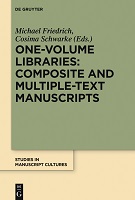One-Volume Libraries
Composite and Multiple-Text Manuscripts
Contributor(s)
Friedrich, Michael (editor)
Schwarke, Cosima (editor)
Collection
European Research Council (ERC)Language
EnglishAbstract
Composite and multiple-text manuscripts are traditionally studied for their individual texts, but recent trends in codicology have paved the way for a more comprehensive approach: Manuscripts are unique artefacts which reveal how they were produced and used as physical objects.
While multiple-text manuscripts codicologically are to be considered as production units, i.e. they were originally planned and realized in order to carry more than one text, composites consist of formerly independent codicological units and were put together at a later stage with intentions that might be completely different from those of its original parts. Both sub-types of manuscripts are still sometimes called "miscellanies", a term relating to the texts only. The codicological difference is important for reconstructing why and how these manuscripts which in many cases resemble (or contain) a small library were produced and used.
Contributions on the manuscript cultures of China, India, Africa, the Islamic world and European traditions lead not only to the conclusion that "one-volume libraries" have been produced in many manuscript cultures, but allow also for the identification of certain types of uses.
Keywords
Manuscripts; Multiple-TextDOI
10.1515/9783110496956ISBN
9783110496932; 9783110496956OCN
1056547823Publisher
De GruyterPublisher website
https://www.degruyter.com/Publication date and place
Berlin, Germany, 2016Grantor
Series
Studies in Manuscript Cultures, 9Classification
Biography, Literature and Literary studies


 Download
Download